Park benches, fence posts from plastic bottles
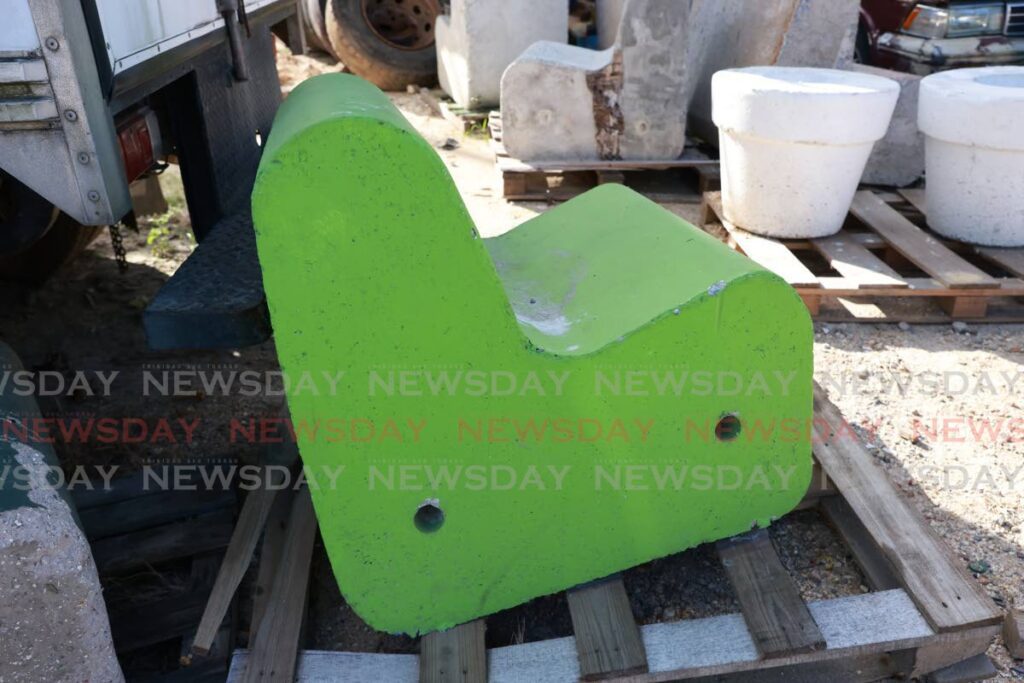
Living in TT for three decades, Juan Andrade has made it his mission to protect as best he can the environment of the country he calls home.
His vehicle for doing so, the Flying Tree Environmental Management NGO, was registered in 2019 but has been in existence for over 20 years.
Flying Tree is funded, in part, by Milagros Solutions Ltd, a plastic bottles and caps manufacturing company of which Andrade is a director. Those funds are used to recycle plastics and reforest the Manzanilla area.
It also runs social, empowerment, and community improvement programmes, assisting migrants, the less privileged and the vulnerable.
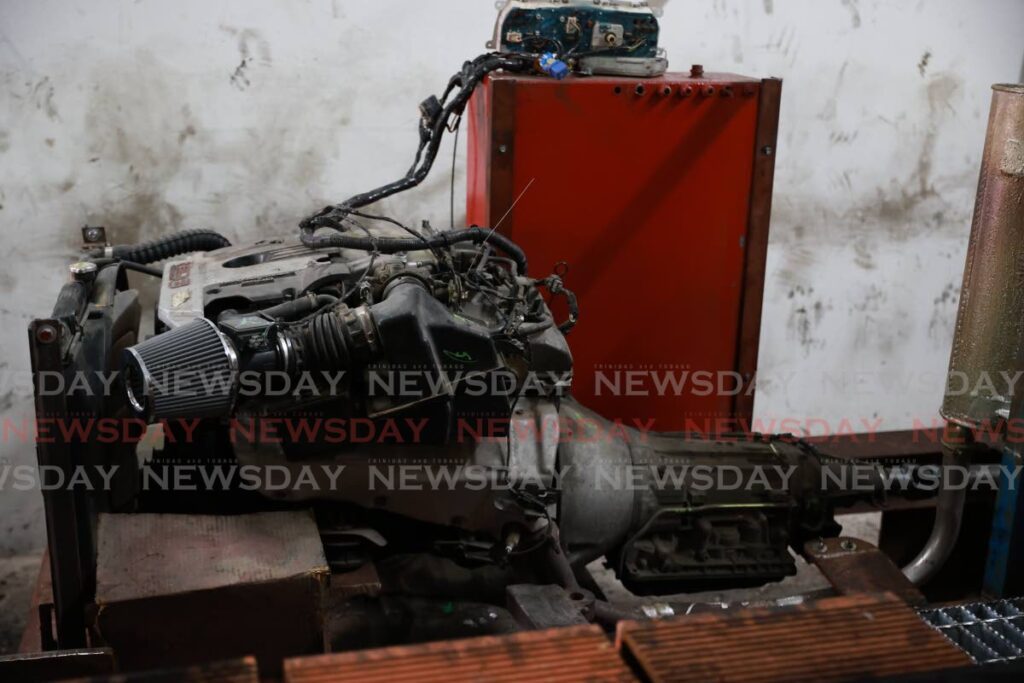
Among other things, Flying Tree collects plastic from beaches and rivers, the Environmental Management Authority’s iCare programme through SWMCOL, from private entities such as Hadco Group’s recycling division, Brydens and Vemco in Diego Martin, San Juan, and Carapo, and other manufacturers, and converts it into useful products for all to enjoy.
Andrade told Sunday Newsday, “When you exhaust the ways to remove a harmful particle from the environment, you need to sequester it. In other words, you need to take it out of the environment and put it in a place where it cannot be harmful to the environment and to humans.
“We take the plastics that are difficult to process into plastic lumber and we use it as an aggregate for concrete products. And in that way, we also create benches, construction blocks, pavers, planters and giant tiles for difficult-to-access-area emergency programmes to create temporary access routes for heavy load vehicles.”
He stressed that plastics are not only in bottles and they are not “the enemy.” Plastics are used in eyeglasses, packaging, cell phones, stationery, sneakers, shrink film, toys, tampon applicators, bags, containers, fans, the microbeads in facewash, shampoo bottles, hair extensions, buckets and much more.
“We collect huge amounts of plastic from pre-consumers, but very important to understand is why we are so successful with our programmes. Over the years, by bad teaching and learning techniques and bad management of procedures, people thought the plastic problems in the environment was just the bottles.
“But investigators and teachers at UWI have shown that, in TT at least, plastic bottles only account for 23.5 per cent of the problem. But the plastic bottles are what you can see every day.”
He said it was the responsibility of the makers of products to tell customers how to use the products and how to recycle them. Flying Tree has taken up some of that responsibility, not just by creating the plastic lumber and concrete sequester, but through training.
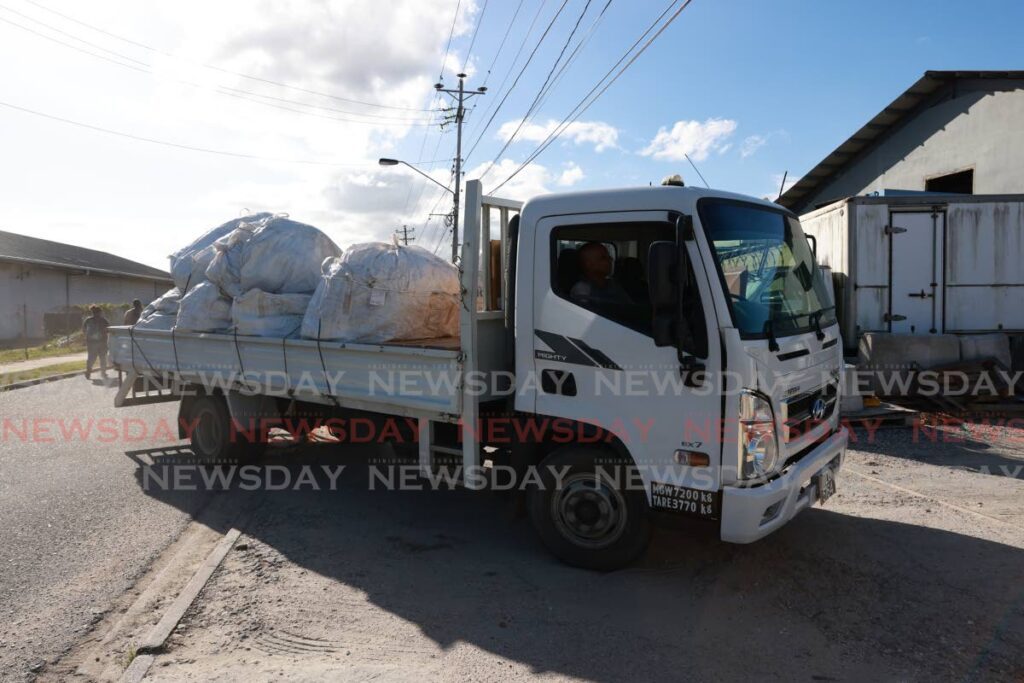
“Flying Tree is not just about making plastic lumber. It’s about educating, training and ensuring that the population gets a level of understanding of the bad use of plastic and stop demonising plastic as a bad item.”
The NGO has programmes to educate secondary and tertiary students about plastics and the importance of recycling as well as the process itself. It also trains private companies in how to recycle the plastics from their factories so, eventually, each factory could complete the first stages of reycling – sorting and granulating the plastics. Then the plastic flakes could be taken to Flying Tree to be blended, heated and compressing into a final product.
Romella Sayneeram, the project co-ordinator at Flying Tree, said the organisation tries to collect at least the same weight in plastic that Milagros makes to offset what the company puts into the environment.
She said plastic lumber can be the same size but different weights, depending on the type of plastics used. But generally, a picnic bench with its two benches and one table used about 250 kg of plastic to create, while a concrete two-seater park bench with a four-by-six-foot platform used about 500 kg of plastic.
She told Sunday Newsday it uses one to 1.5 per cent of plastic to make concrete products or ten-15 kg of plastic for every 1,000 kg of cement. She said it usually uses 1.5 per cent for benches and less plastic for foundations, tiles and other products that need to be more durable.
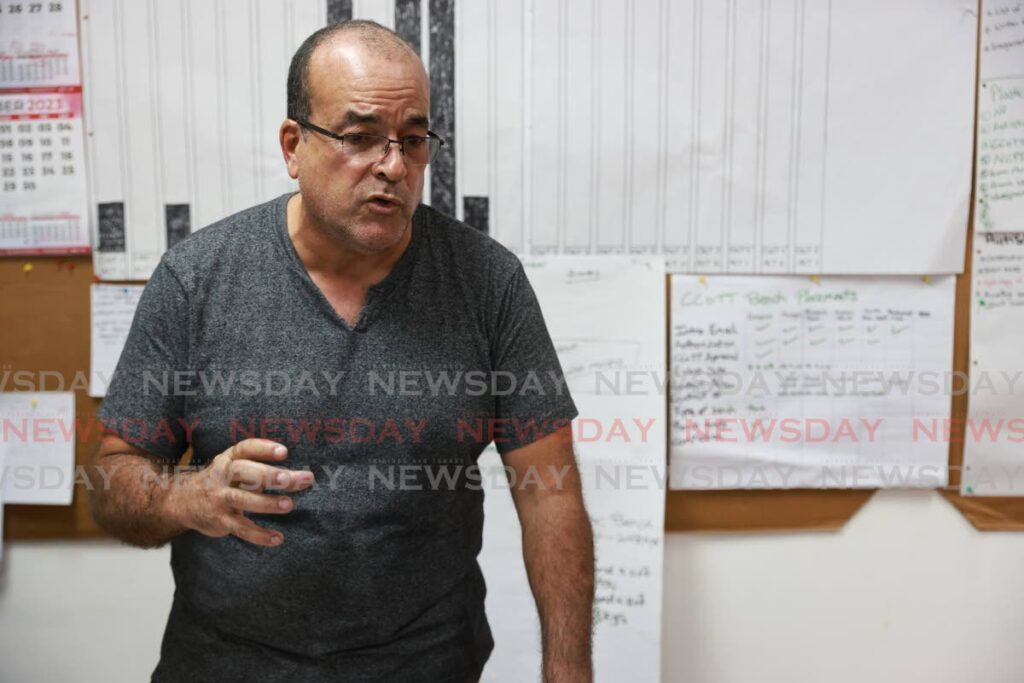
Sayneeram said several other entities collect, grind and compact plastics, usually to export for recycling, but, at the moment, no one else in TT actually recycles plastics.
“The concept behind all the projects we do includes sustainability as a main factor. From the get-go we start looking at how to make the programmes run by themselves.
“In the long run we want to have a similar system to the scrap-iron people, passing around in residential areas and buying plastics. We want people to be more aware of it and start collecting their laundry baskets, bleach bottles, cosmetics, and so on and sell it through the micro-handler, who would then come by us and get paid.”
She added anyone who wants to can drop off plastics at the Milagros facility in Arima, but they should ensure the plastics are clean and any metal parts removed.
Sustainability is paramount
Flying Tree Environmental Management is collaborating with the CEDAW Committee of TT (CCOTT) to instal benches throughout the country. At $3,500 per bench, it has 36 benches left to instal, which it is doing free of charge .
It is also building a greenhouse for the Autistic Society with the help of UNDP and, about five years ago, installed temporary walkways at the Emperor Valley Zoo, which were left as a foundation when they were permanently paved.
It has also worked with the Tobago House of Assembly, the Environmental Management Authority, some government agencies and private entities installing planters, benches, deckings and jetties.
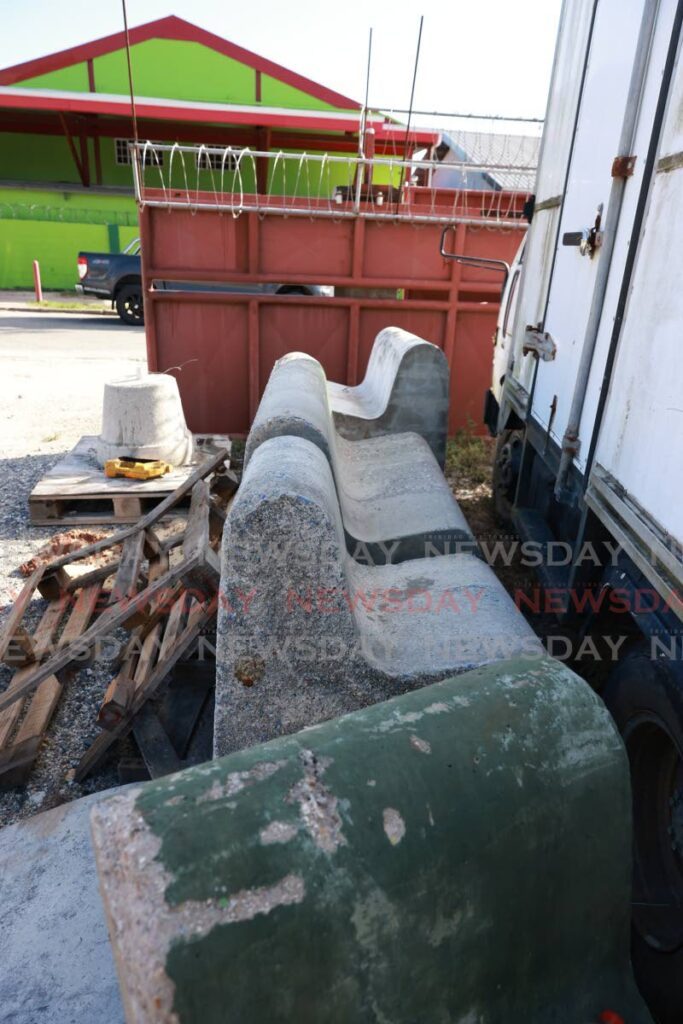
During the covid19 pandemic Flying Tree distributed over 5,000 agriculture grow kits, which included soil, food seeds and seedlings, fertilisers and more, around TT, in collaboration with the UN and several police youth clubs.
It also sold hundreds of grow kits that people used, not just for food or the environment, but for their mental health during the pandemic lockdowns. It is continuing to make grow kits for sale but this time using plastic lumber.
Flying Tree also received a grant from the Global Environment Facility Small Grants Programme of the UNDP to open two plastic recycling and learning centres in Kernahan Village, Manzanilla and Roxborough, Tobago. Its projects are funded through the NGO’s direct relationship with Milagros Solutions Ltd. Andrade said because the directors of Flying Tree are business people, they knew how to make money and how to make an NGO sustainable.
“The associated people, family and friends, we decided to trade our wealth for a better TT. The interesting part in this association is that we have a minority of Trinidadians. The majority are Venezuelans, then Cubans. We have a couple Guyanese, Jamaicans and Trinidadians. We are part volunteers and part workers.”
He said when Milagros’ plastic bottles are scratched or marred in some small way, many businesses do not want them. Rather than throw them away, Flying Tree fills those bottles with products such as laundry and dishwashing detergents, fabric softener, and disinfectants, which they make with the help of a local chemical manufacturer. And because the bottle are free to the NGO, it can sell the products at lower prices.
Another funding endeavour is selling concrete sequester to private companies.
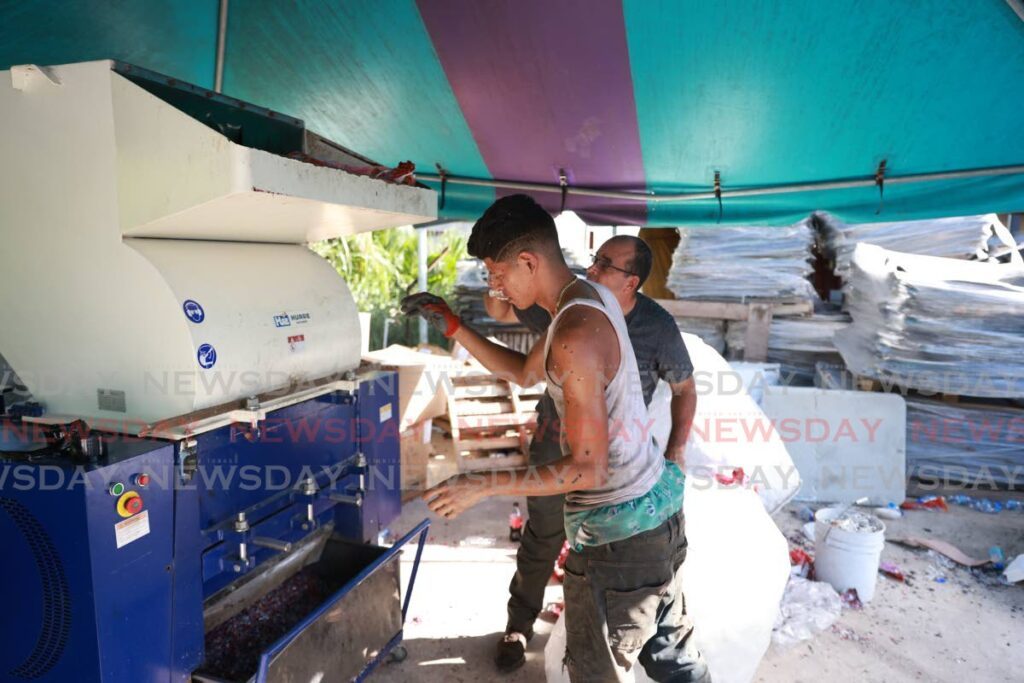
“All the technologies that we can apply, that we discover, that we do are aimed at using the discarded plastic as good raw materials, as a revenue item easily available in the garbage in TT.
"So plastics are good. What you do with the plastics is the problem.
“Everything in life is based in plastics. We over-consume, like everything else, but we could do without a bit. We could reduce, reuse, recycle and that would make a better planet.”
In addition to recycling, Flying Tree also uses paragliders to scatter seeds in the swamps and forests of Manzanilla to reforest the area by air. The method lets volunteers reach difficult-to-get-to areas without damaging plants.
Andrade said he, his friends and family started the TT Paragliding Association in 2001 and it has represented TT internationally in competitions. Some members are at pre-Olympic levels and take people paragliding for a contribution – in kind or cash – also which helps fund the NGO’s operations.
“Due to the diverse background of our team, we found the capacity to deal with such a difficult task, which is environmental rehabilitation. We create/design programmes using unique methods that includes sports, such as paragliding, hiking, etc, where we are able to educate the population while rehabilitating the environment.”
When ask why he and his business partners decided to invest in TT, Andrade said they were making money, but that money did not secure the health and safety of their families.
“Twice in my life my only answer came from kneeling down. At that point I realised, ‘This (making money) is not my purpose.’ If you don’t do what He (God) tells you to do with what He gives you, He may stop giving.”
Andrade came to TT from Venezuela 29 years ago as an aeronautical engineer, fixing jet and helicopter turbine engines. He worked at several other jobs and started other businesses before he and his family opened a packaging company.
He said when you die you cannot carry the money with you, so if you are wealthy and successful, you should share with the people around you.
Recycling in TT
Terri-Anne Carter-La Fon, Solid Waste Management Company Ltd (SWMCOL) recycling and recovery manager, said it works with Flying Tree, providing the NGO with plastics it could not process.
She said SWMCOL processes PET (polyethylene terephthalate) and HDPE (high-density polyethylene) it mainly received from the iCare programme for sale to local and overseas recyclers.
It also receives a small percentage of its material from SWMCOL’s three collection sites which were gathered from public agencies and private entities.
The organisation sorts materials into about 20-25 categories but post-consumer plastics have seven categories – PET, HDPE, PVC or polyvinyl chloride, LDPE or low-density polyethylene, PP or polypropylene, PS or polystyrene and other.
It also sorts the PET and HDPE containers by colour, what was in the containers (beverages, oil, chemicals) and, if possible, separates the labels from the bottles, as they are usually two different types of plastics.
She lamented that people know what could be recycled abroad and put those materials in the collection bins. But, depending on what the plastics contained, it can be difficult to recycle on the international market. She added that SWMCOL has to adhere to the Basel Convention, which prohibits the exports of hazardous plastic waste intended for final disposal or recovery operations.
“Contamination is a big issue, particularly with paper and paper products like napkins and pizza boxes. People don’t understand that from the time it is oily or wet, it can't be used.
“A lot of these places away have incinerators, so if it's not put into recycling, it can go into the incinerator and it’s still captured as recycling. But for us, we don't have an incinerator, so it has to go to the landfills.”
After sorting, SWMCOL washes, grinds, compacts and bales the plastics. It does not have a HDPE wash plant, so cannot process some of those containers, especially if they contained any type of oil. For those that cannot be processed or reused in-house, arrangements are made for Flying Tree to take them.
Carter-La Fon said SWMCOL recently started a pilot programme collecting LDPE – the plastic wrapped around cases of beverages – to see how much they would get so it could be sent to Flying Tree.
She said, in general, one 40-foot container of material is exported every two weeks. One container of PET is usually between 13,000 and 15,000 kg, and a container of HDPE weighs about 14,000-16,000 kg.
“One of the important things to note about recycling is that, for it to make sense, you need to have large volumes of material. Recycling is not something where you can have a little bit of material – two yogurt cups here, two food containers there and you can make up something and sell. No.
“So right now one of the things that keeps us back from processing the other types of plastics is that we don't have enough. We primarily get PET and HDPE. So what happens with the other material is that it has to go to a landfill, because we simply don't have the volumes nor the space to keep everything until we could build up the volumes that we need.
“Essentially we do have to move towards a society that separates everything at source, and we have to find outlets for these things, because once it's being manufactured, then the environmentally sound management of these types of waste has to be dealt with.”


Comments
"Park benches, fence posts from plastic bottles"